- Home
- Barry Lyga
MARVEL's Avengers: Infinity War: Thanos
MARVEL's Avengers: Infinity War: Thanos Read online
Copyright
This book is a work of fiction. Names, characters, places, and incidents are the product of the author’s imagination or are used fictitiously. Any resemblance to actual events, locales, or persons, living or dead, is coincidental.
© 2018 MARVEL
Cover design by Ching N. Chan. Cover illustration by Stephan Martiniere.
Hachette Book Group supports the right to free expression and the value of copyright. The purpose of copyright is to encourage writers and artists to produce the creative works that enrich our culture.
The scanning, uploading, and distribution of this book without permission is a theft of the author’s intellectual property. If you would like permission to use material from the book (other than for review purposes), please contact [email protected]. Thank you for your support of the author’s rights.
Little, Brown and Company
Hachette Book Group
1290 Avenue of the Americas, New York, NY 10104
Visit us at LBYR.com
First Edition: November 2018
Little, Brown and Company is a division of Hachette Book Group, Inc. The Little, Brown name and logo are trademarks of Hachette Book Group, Inc.
The publisher is not responsible for websites (or their content) that are not owned by the publisher.
Library of Congress Control Number 2018949558
ISBNs: 978-0-316-48251-6 (hardcover), 978-0-316-48258-5 (ebook)
E3-20180929-JV-PC
Contents
Cover
Title Page
Copyright
Dedication
Epigraph
Time
Chapter I
Reality
Chapter II
Chapter III
Chapter IV
Chapter V
Chapter VI
Chapter VII
Chapter VIII
Chapter IX
Space
Chapter X
Chapter XI
Chapter XII
Chapter XIII
Chapter XIV
Chapter XV
Chapter XVI
Chapter XVII
Chapter XVIII
Chapter XIX
Chapter XX
Chapter XXI
Chapter XXII
Chapter XXIII
Chapter XXIV
Chapter XXV
Chapter XXVI
Mind
Chapter XXVII
Chapter XXVIII
Chapter XXIX
Soul
Chapter XXX
Chapter XXXI
Chapter XXXII
Chapter XXXIII
Chapter XXXIV
Chapter XXXV
Chapter XXXVI
Power
Chapter XXXVII
Chapter XXXVIII
Chapter XXXIX
Chapter XL
Chapter XLI
Chapter XLII
Chapter XLIII
Chapter XLIV
Time
Chapter XLV
Acknowledgments
TO THE FOLKS AT THE COMIC SHOP.
There are as many tales of the origins of the Mad Titan, THANOS, as there are stars remaining in the sky. This is but one of them.
It is also the truth.
CHAPTER I
I’VE SNAPPED MY FINGERS.
And—
I am adrift in myself, alone with my past, my present. The sheer existence of me is at once a weighty and a weightless thing. Time is not an arrow or a line or any other convenient metaphor; Time is not an abstract notion.
Time is a Stone.
With the Stone, all history is open to me. I am in history. I am history. I witness it and relive it and experience it in the same quantum instant.
For the first time in years, I behold the orange-swaddled orb that is Titan. From a distance of thousands of kilometers, the planet looks the same as when I left, with no indication as to the havoc that lurks beneath the haze.
And then it’s years later, and my forces wage combat against Her Majesty Cath’Ar’s troops aboard the Executrix. Bodies spill into space as the Leviathans mass for a second attack run.
And now Korath tells Ronan:
“Thanos is the most powerful being in the universe!”
And Ronan, the fool, responds:
“Not anymore.”
Unmoored from the present, observing without interfering, I watch my life and my certainty as they play out. I am the foregone conclusion to my own prophecy. Korath’s warning has come true, and now I truly am the most powerful being in the universe, perceiving all reality from the vantage point of ultimate power.
Not much more than a boy, I tilt the glass to my lips. The liquid within is green, bubbly, and too sweet, tasting of melon and elderberries and ethyl alcohol.
I am a child and my father tells me, “Your mother went mad the moment she laid eyes on you.” There is a softness to his voice noticed only in retrospect, with adult eyes laid upon the childish past.
This changes nothing. Everything is done. Everything will be done.
Years later, my ship launches from the surface of Titan, bearing me into the unknown. I tell myself that everything I know lurks beneath that haze, and then I tell myself that it doesn’t matter.
Swaddled in the verdant energies of the Time Stone, my mind traverses decades at the speed of thought, spinning the jewel of my life from facet to facet.
“You’ll die there, Titan,” says Vathlauss, choking on his own blood and Kebbi’s poison. “You’ll die in the glory that is Asgard.”
I watch, paralyzed and helpless, as Gamora swings her battle-staff…
… and Daakon Ro postures and threatens on my viewscreen…
… and the Other speaks to me in the wreckage of the Chitauri staging base:
“Humans… They are not the cowering wretches we were promised. They stand. They are unruly and therefore cannot be ruled. To challenge them is to court death.”
I am striding through the bodies of Asgardians, the dead remnants of that once proud civilization, as Ebony Maw proselytizes to the few who still live.
I am beating the Hulk nearly to death…
… and hurling Gamora from the cliff on Vormir…
… and then—years previous—a voice, the voice of my only friend:
“You’re a coward, Thanos! A coward! You hide behind this ship, behind the Other and the Chitauri, and now behind those girls!”
Years leapfrog one another, spurting ahead in an instant, and I am aboard Sanctuary. The protective doors to my vault slide open, and the Gauntlet glimmers there in half-light, not quite gold.
I have seen this moment before. I have lived it. It is happening for the first time, the second time, the millionth time.
I reach for it.
“Fine,” I say. “I’ll—”
CHAPTER II
THE PROBLEM WITH TITAN WAS THAT IT WAS PERFECT. AND even as a child, Thanos knew nothing was truly perfect. Every diamond had its flaw, and every saintly soul had its black spot of guilt, shame, or restless abnegation. Titan, too, suffered from an imperfection.
That imperfection, as best he could tell, was Thanos himself.
Son of A’Lars—the High Mentor of Titan, architect of the Eternal City—and Sui-San, his absent mother, Thanos was, at birth, a shock to his people. His appearance was a jolt of adrenaline to a body at rest. Distinguished from Titan’s populace by dint of his deformation and purplish hue, he was prominent in ways and for reasons beyond his control yet fixed permanently in his very physical being. On Titan, the people’s flesh reflected a range of splendid colors. But none was purple, the color of death
, the color of ill omen.
Save Thanos.
From the Vast Salt Sea on the other side of the planet to the glimmering bronze range of cryovolcanoes just outside the Eternal City, Titan was a united world, more than the sum of its parts, a resplendent and cohesive whole. The Eternal City was a perfect blend of architecture and engineering, its soaring spires and towers nestled together in a collection of utmost harmony. A world absolutely in tune with itself.
Except.
For.
Thanos.
His skin color, along with a series of vertical ridges—furrows that made his flesh look as though it had been raked—widened his expansive jaw. These traits marked him a deviant, a mutated thing. Had his father been anyone but A’Lars, his mother anyone but Sui-San, he most likely would have been consigned to a medical facility somewhere. Poked and prodded his whole life, quarantined from polite society.
Instead, he was left in A’Lars’s care. Sui-San disappeared shortly after his birth.
He walked at six months. Not the drunken toddle of a baby, but the confident stride of a man. He could already hold himself erect, control the movement of his head and neck. He had complete coordination of his limbs, and his bearing was that of an adult.
Two days shy of his first birthday, he spoke. Not a word, but rather a full sentence: “Father, will there be a birth celebration for me, and will Mother attend?”
He’d been capable of speech for weeks but had waited until he’d fully parsed the nuances of sentence structure to issue his first words.
Before either of those milestones, he knew he was different in a world that prized conformity and unanimity above all else.
“Mother will not attend,” A’Lars had said. If his father was surprised by Thanos’s speech and his diction, he did not show it. “I will arrange for friends.”
I will arrange for… Those words preceded most of A’Lars’s statements. Thanos’s father rarely touched his son, rarely even looked at him. In regard to Thanos’s needs, he only ever said I will arrange for… and then did just that, with efficiency and aplomb.
Thanos wanted for nothing. Needed nothing.
Except to belong.
As good as his word, A’Lars arranged for friends: a collection of androids designed to look and act like toddlers. They were programmed to distract Thanos and keep him dumbly happy and content.
In time, he’d figured out their programming and rewrote their algorithms. He now had a coterie of robotic servants that amused him but accomplished little else. His restless mind craved more.
“Very well,” A’Lars relented. “School.”
Generations ago, it had been the common practice to install children in thought-cribs and educate them through direct cerebral interface. That practice had long fallen out of favor by the time of Thanos’s birth. It was now fashionable to add an interactive social element to education, placing a group of children together in a school, where they could theoretically enhance one another’s learning and also facilitate socialization.
Thanos was excited by the prospect of school. Other than the reprogrammed androids, he’d had no companionship, and he looked forward to meeting other children his age.
“Be polite,” A’Lars told him on their way to the education complex in their floater. “Speak only when directed to.”
“Yes, Father.” Thanos bobbed his head in agreement. Through the clear shell over the floater, he could see other floaters, the tops of buildings, and the distant mountain ranges of Titan. His world was beautiful and at peace, and he longed to explore every part of it.
“The teachers have been warned about your appearance,” A’Lars reminded him. “Try not to do or say anything upsetting or untoward.”
His appearance. Almost unconsciously, he ran one finger along his jawline.
At some point in Titan’s distant past, for reasons no one could any longer remember, the color purple had become associated with death, a connection that persisted to the present. When Titans died, their bodies were covered with purple shrouds. The lights in their residences were tuned to the violet portion of the spectrum for the grieving period.
He’d first encountered this association when his father received a visitor in their home. Thanos was four years old, and the visitor was an elderly woman, a friend of A’Lars’s parents, seeking advice from the High Mentor of Titan. She wore shades of purple from head to toe, including a veil covering her face, a veil that was the precise color of Thanos’s own skin.
The coincidence of her clothing and his own skin color thrilled Thanos, as coincidences often do to children. When she left, he babbled to his father about the color of her clothes, about the way the veil so perfectly matched his own flesh.
And A’Lars had explained, in blunt language, that she wore that color because she was in mourning. She was a widow, and so she wore the color of death.
Thanos’s excitement had curdled. Of all the hues his maladapted genes could have chosen to express, why did it have to be purple?
Now, at the education complex, A’Lars led him down a corridor, peering around and occasionally sniffing in barely disguised annoyance. “Uninspired design and workmanship,” he commented. “Do not allow your surroundings to infect your breeding, Thanos.”
“I will not, Father,” Thanos promised, fighting to match his father’s disinterested deportment. Inside, he was ecstatic to be among his peers; he knew his father disapproved of expression of emotion, so he suppressed his excitement.
At a doorway, father and son paused. Thanos waited as his father thumbed open the door.
This would be the first time in his awareness that Thanos would be separated from his father for more than an hour or so. He opened his mouth to say something, but A’Lars nodded curtly at him and said, “Don’t be late,” followed by, “Learn well,” before turning and striding back down the corridor they’d walked together.
Thanos nodded to himself, then stepped into the education chamber.
It was a smallish room with a series of twelve personal interface pods that could be arranged in any formation. At that moment, they were lined up in two ranks of six each, all facing the front of the chamber, where stood an adult in a gray tunic and slacks, his hands clasped behind his back. He had thick black hair pomaded to his skull like a helmet, and skin the color of a pale morning sky.
The teacher smiled and—to his credit—did an admirable job concealing his startled reflex at the sight of Thanos.
But Thanos noted it. The school had been advised he was coming. They knew who and what he was. And yet still, his appearance shocked.
“And you must be Thanos,” the teacher said. Thanos thought it an absurd thing to say—who else could he be?—but the teacher’s smile was pleasant, and Thanos bore in mind his father’s admonitions. So he simply nodded and said, “Yes.”
“Class, welcome a new friend and fellow learner: Thanos.”
Eleven of the pods rotated enough that the children within could get an unobstructed view of the newcomer. Thanos felt a frisson of panic at twenty-two eyes boring into him, then forced the panic away. They were children. Like him.
“Take the empty pod, please,” said the teacher. “Today we’ll be studying color and patterns.”
He scrambled into the pod. Its padded interior shifted into a cocoon as he settled into place. Now, here, he was comfortable. In his element. The interface pod was an older model than the one he had at home, but it was serviceable. He ran a few updates on its firmware, then connected it to the pod at home.
Colors and patterns. As the teacher spoke and the pod conjured images for him to absorb, he realized how incredibly bored he was already. He’d already learned about color from his father, from the nature of light to the manipulation of pigments. Patterns—from plaids to stripes, dots, and organics—were similarly old news to him. Was this really the best way for him to learn?
He tamped down his impatience. He had wanted this, after all; he couldn’t give up on it after a few minutes.
With a sigh, he switched his pod to accelerated mode and flashed through the lesson at twice the speed.
If the learning portion of school was dull, then at least there was the social aspect to look forward to. There was a break at noon for food and physical recreation. Thanos was no fool—he understood that the physical component was designed to tire out the students and make them more manageable. He felt he was already incredibly polite and deferential (having not pointed out two or three errors his teacher had made earlier), so he forsook the running around and wild play of his classmates and instead sat quietly in a corner, studying a rudimentary hologram of a synthetic neural pathway. If improved, it would make synths much more lifelike.
A cluster of children gathered not far from him. They spoke in hushes and murmurs, occasionally pointing in his direction. He did his best to ignore them, while at the same time wondering how he could engage them.
Maybe this had been a mistake, this schooling. Maybe he should have stayed at home. He had not imagined himself the center of attention, a thing to be spoken of and not to.
But just then, a girl named Gwinth approached him. “We have a question for you,” she said. And before he could say anything, she went ahead and asked it: “Why are you purple?”
Thanos blinked with something like confusion. No one had ever asked that simple question before. She seemed more curious than frightened or disgusted. Perhaps his father had overestimated people’s reaction to his appearance.
“I’m not entirely sure,” he admitted. “It’s a mutation.”
“A what?”
As they spoke, the other children gathered around them. Thanos tried to figure out the best way to explain it, but the truth was that he only partly understood it himself. There were things called genes that made people who and what they were. Something had gone wrong with one of his.
“Where are the genes?” Gwinth asked, and ran her hands randomly over her body, feeling for them. Others followed suit.
Thanos shook his head. “They’re tiny. Microscopic.” A thought occurred to him and a light blossomed within—here and now, he’d been presented with a great opportunity. He had the attention of his fellows. They didn’t seem afraid of him or disgusted, just curious. If he could explain some part of himself to them…

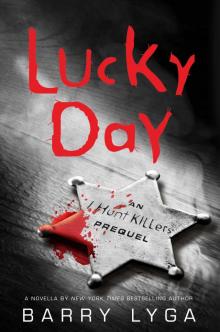 Lucky Day
Lucky Day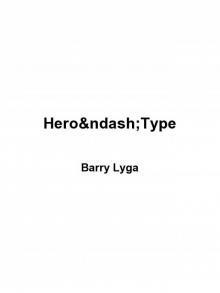 Hero-Type
Hero-Type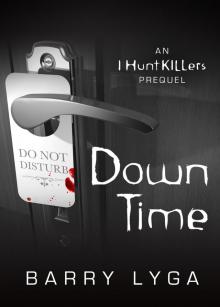 Down Time
Down Time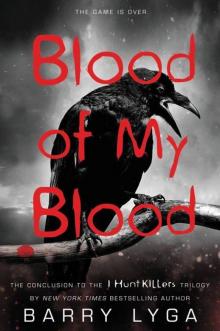 Blood of My Blood
Blood of My Blood Goth Girl Rising
Goth Girl Rising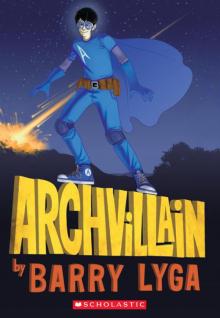 Archvillain
Archvillain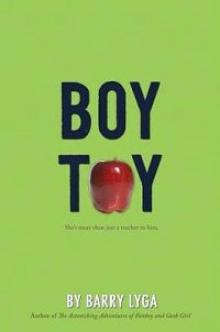 Boy Toy
Boy Toy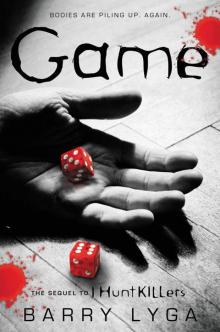 Game
Game Bang
Bang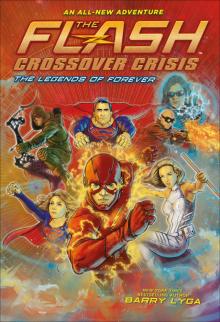 The Legends of Forever
The Legends of Forever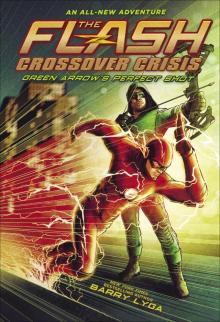 The Flash: Green Arrow's Perfect Shot
The Flash: Green Arrow's Perfect Shot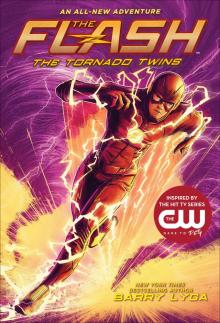 The Flash: The Tornado Twins
The Flash: The Tornado Twins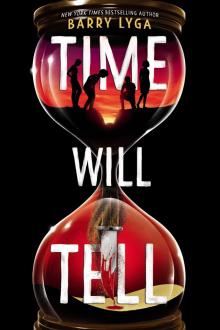 Time Will Tell
Time Will Tell The Secret Sea
The Secret Sea The Hive
The Hive Career Day
Career Day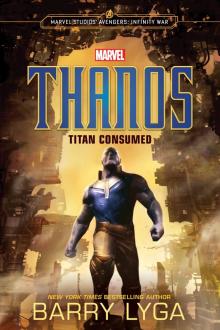 MARVEL's Avengers: Infinity War: Thanos
MARVEL's Avengers: Infinity War: Thanos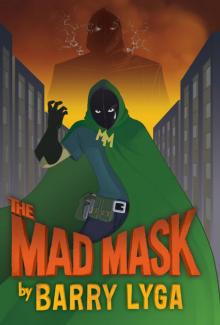 The Mad Mask
The Mad Mask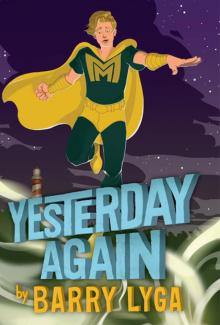 Yesterday Again
Yesterday Again I Hunt Killers
I Hunt Killers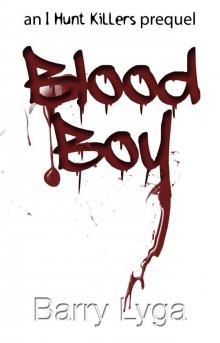 Blood Boy
Blood Boy Neutral Mask
Neutral Mask The Astonishing Adventures of Fanboy and Goth Girl
The Astonishing Adventures of Fanboy and Goth Girl I Hunt Killers Neutral Mask
I Hunt Killers Neutral Mask Neutral Mask: an I Hunt Killers prequel
Neutral Mask: an I Hunt Killers prequel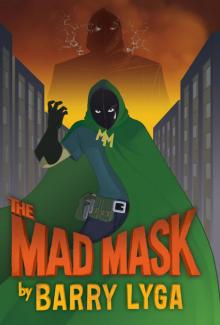 Mad Mask
Mad Mask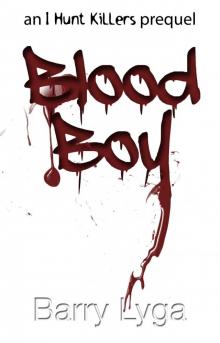 Blood Boy: an I Hunt Killers prequel
Blood Boy: an I Hunt Killers prequel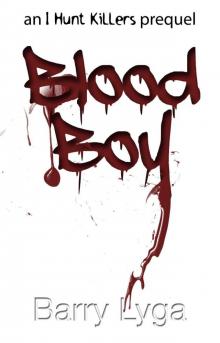 I Hunt Killers Blood Boy
I Hunt Killers Blood Boy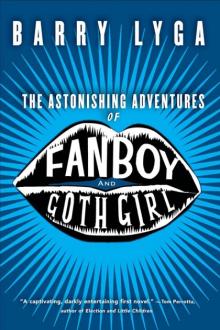 The Astonishing Adventures of Fan Boy and Goth Girl
The Astonishing Adventures of Fan Boy and Goth Girl